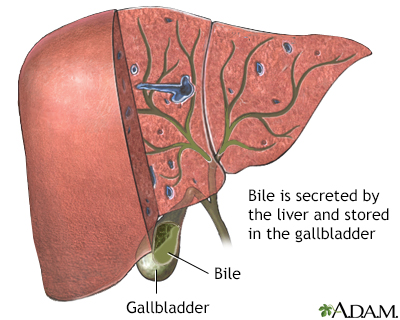Bile
Bile is a fluid that is made and released by the liver and stored in the gallbladder.
Bile helps with digestion. It breaks down fats into fatty acids, which can be taken into the body by the digestive tract.
Bile contains:
- Mostly cholesterol
- Bile acids (also called bile salts)
- Bilirubin (a breakdown product or red blood cells)
It also contains:
- Water
- Body salts (such as potassium and sodium)
- Copper and other metals (attached to proteins)
Reviewed By
Linda J. Vorvick, MD, Clinical Professor, Department of Family Medicine, UW Medicine, School of Medicine, University of Washington, Seattle, WA. Also reviewed by David C. Dugdale, MD, Medical Director, Brenda Conaway, Editorial Director, and the A.D.A.M. Editorial team.
Hall JE, Hall ME. Secretory functions of the alimentary tract. In: Hall JE, Hall ME, eds. Guyton and Hall Textbook of Medical Physiology. 14th ed. Philadelphia, PA: Elsevier; 2021:chap 65.
Radkani P, Hawksworth J, Fishbein T. Biliary system. In: Townsend CM Jr, Beauchamp RD, Evers BM, Mattox KL, eds. Sabiston Textbook of Surgery. 21st ed. St Louis, MO: Elsevier; 2022:chap 55.


 All rights reserved.
All rights reserved.